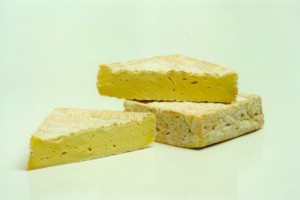
|
|
|||||
This is probably the oldest Norman cheese still in production today, and is derived from the Medieval cheese Angelot. In his book 'Roman de la Rose' from 1263A.D., Guillaume de Lorris claimed "a good table wine always finishes with a dessert d'angelot". The name Pont l'Eveque comes from a small town between Liseux and Deauville in the Pays d'Auge. During the 17th Century cheeses were sent from Pont l'Eveque all over France. Pont l'Eveque was granted AOC status in 1976 to protect its history and good name. However, most Pont l'Eveque produced today is factory made. In 1991, of the 3,727 tonnes produced, only 2% were fermier or farmhouse cheeses. It is farmhouse Pont l'Eveque that we sell at The Teddington Cheese. It takes 3 litres of milk to make one 400 gramme cheese. According to A.O.C. regulations, the milk used must come from the local area and the curd must be kneaded before it is drained. Milk is coagulated as soon as possible after milking, preferably when still warm from the udder. Curds are lightly cut and drained for 10 minutes, before being transferred to moulds and put in the curing room. Here the cheeses are kept in a humid environment for 6 to 8 weeks to mature. To obtain the washed rind they must be rinsed in brine at regular intervals. The rind may become pink in colour and sticky to the touch as it ripens, and small holes may appear in the pâte. The odour can become very strong, but not as ammoniacal as the closely related Camembert. The best season for Pont l'Eveque is from the summer to early winter. In France it is often enjoyed with a glass of Normandy Cider. Our fermier cheese is made from the milk of the diminutive Normandy cows. Each cheese is 11cm square, 3cm deep, weighs 400g and has a fat content of 45-50%. It is presented in a wooden box. Click here or press your 'Back' button to return |
|
|||||
| All articles © www.teddingtoncheese.co.uk | ||||||
